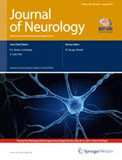MacManus DG, Miller DH, Kappos L, Gold R, Havrdova E, Limmroth V, Polman CH, Schmierer K, Yousry TA, Eraksoy M, Meluzinova E, Dufek M, Yang M, O´Neill GN, Dawson K. J Neurol. 2011 Mar;258(3):449–56. Epub 2010 Oct 21. IF: 2.903

Abstract:
BG-12, an immunomodulatory agent, reduces frequency of new gadolinium-enhancing (Gd+) lesions in relapsing multiple sclerosis (MS). This study reports the effect of 240 mg BG-12 orally three times daily (tid) for 24 weeks on the evolution of new Gd+ lesions to T1-hypointense lesions. Brain magnetic resonance imaging (MRI) scans from patients in placebo and 240 mg BG-12 tid arms of a phase 2b study were examined retrospectively. Included patients had at least one new Gd+ lesion from weeks 4 to 12. Week 24 scans were analyzed for number and proportion of new Gd+ lesions that evolved to T1-hypointense lesions. Eighteen patients receiving BG-12 and 38 patients receiving placebo were included in the analysis. The analysis tracked 147 new Gd+ lesions inpatients from the BG-12 group and 221 Gd+ lesions in patients from the placebo group. The percentage of Gd+ lesions that evolved to T1-hypointense lesions was 34% lower with BG-12 treatment versus placebo (29%, BG-12; 44%, placebo; odds ratio 0.51; 95% confidence interval 0.43, 0.61; p < 0.0001). In addition to reducing frequency of new Gd+ lesions, BG-12 significantly reduced probability of their evolution to T1-hypointense lesions in patients with MS compared with placebo.
-mk-